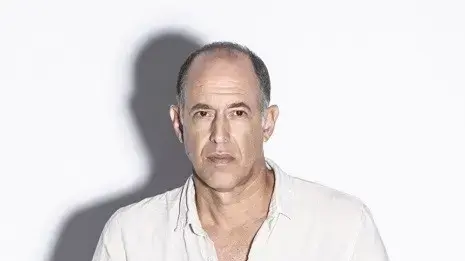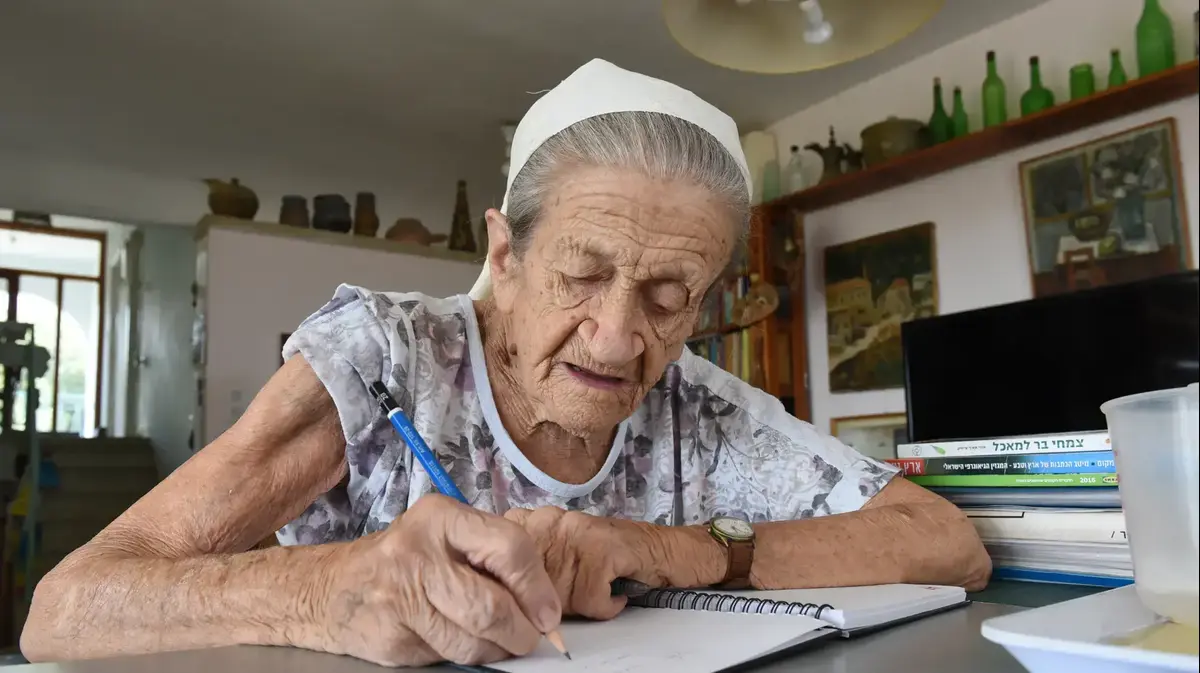"Eddie King" celebrates thirty: Gidi Dar returns to the film that became a myth
On the occasion of the premiere of the remake of "Eddie King", director Gidi Der explains why it failed when it first came out thirty years ago and how it became a myth, recalling the first meeting with Ronit Alkabatz and Shuli Rand and the surprising phone call from the Prime Minister
Avner Shavit
03/08/2022
Wednesday, 03 August 2022, 00:14 Updated: 04:40
Share on Facebook
Share on WhatsApp
Share on Twitter
Share by email
Share in general
Comments
Comments
The music video for the theme song of "Eddie King" (Ariel Semal)
There aren't many films that the late Uri Klein hasn't yet written about on three separate occasions.
"Eddie King" is one of them.
The legendary critic wrote about it for the first time when it was released in 1992, showering it with compliments and even stating that its ending "would not have embarrassed Almodovar".
In 2013, he wrote about it again, on the occasion of the distribution of its DVD edition, then added in perspective that watching it again is more interesting than watching it in real time.
Last week he wrote about it for the third and last time, and this in honor of the funds for his renewed copy
.
On this occasion, Klein said that although it failed at the box office in real time, the myth surrounding the film "only keeps growing".
As fate would have it, this column was published on the day of the beloved critic's death, and went down in history as his last article, which might further strengthen the myth of "Eddie King".
There are cinema buffs who were not yet born when "Eddie King" premiered thirty years ago, in the same fateful year in which other ritualistic local films were released such as "The Life According to Agfa", "Hesed Mufala" and "Tel Aviv Stories", and Rabin And Clinton came to power.
They will be able to discover the film for the first time tomorrow (Thursday) at the Tel Aviv Cinematheque, which will present the renewed copy in a premiere screening.
Later, the copy will also arrive on VOD of the Cinematheque and it will be possible to watch it from home, but of course it is better to do it on a big screen.
Klein also wrote that "Eddie King" is "cinema as a hallucination", and that "the simplest way to interpret what is described in it is as a series of events in the mind of the hero", and from this it is easy to understand that it is difficult to describe the plot of the mythological work.
The same hero is an unemployed theater actor, whose name is the name of the film, that all the names in it have a wink - "Eddie King" is also the name of a play by Nissim Aloni, Gabi Shoshan here plays a character named Shoshan,
Cinema as hallucination.
From "Eddie King" (photo: Ariel Semal)
Eddie is played by Eitan Blum, who also co-wrote the script, and this is his first and last film role (nowadays he is Dr. Eitan Blum, a researcher and lecturer). The hero he portrays gets on a train and meets a criminal played by Shuli Rand, and his lover played by Ronit Alkabatz. Both actors were then at the beginning of their professional careers, and a couple in their personal lives as well. These two characters drag the hero into a crime case, the details of which are not really important. Nothing here is as it seems, nothing and no one really exists. "Eddie King" It is a fantastic film in the original and purest sense of the word.
The film was written and directed by Gidi Dar, himself a strange bird in the sky of Israeli cinema.
He is the son of the intelligence officer Avraham Der, one of the heroes of "Esek HaBish", and began his career as a musician, until in his early twenties he fell in love with cinema, and decided to move behind the camera.
In 1988, he directed his first film, "The Poet", half an hour long, in which he worked for the first time with Shuli Rand.
"I came from the world of music, which is self-taught in its essence, and I was completely aware and skilled at learning, so I did 'The Poet' at a stage in life when people are not supposed to film a half-hour film, and it went very easily, very easily." Der number in an interview with Walla!
culture.
"Following this, I thought it was really easy, this thing called cinema. I had self-confidence that nothing would stop me, so I said I would do whatever I wanted - I would do an even more radical project, without a script."
To understand how unusual "Eddie King" was at the time in the landscape, you need to understand what the state of Israeli cinema was at the time of its release.
This was one of the gray periods of the industry, where only one shade of action dominated - political dramas.
Or in the more relaxed words of Derr, who never restrained his tongue - "For all kinds of reasons, there was a wave of films with political pretensions, which always leaned to the left," he says.
"These movies confused truth, realism and art, and they were less powerful than the news. When you come to see a movie, you don't want to see reality. Take American political thrillers from the 1970s like 'Three Days of the Condor.' They always knew how to transport you to another world in an instant that the film started. In the Israeli cinema of that time, they failed to make this transition between reality and discussion, and this is how the disconnection between the local audience and the cinema was created, and the phrase 'I don't see Israeli cinema' was born, which to this day some people say,
More in Walla!
With full halls and successful films, everyone came out victorious from the competitions of the Jerusalem Festival
To the full article
Outsider.
Gidi Dar (Photo: Ilya Melnikov)
In light of these circumstances, of course Shader had difficulty finding financing for the film.
"It was also at a time when there was only one foundation, and it was a closed club," he says.
"I remember that I didn't receive support, but 'Stolen Father 3' did. I'm not saying this bitterly, just explaining how things were. The foundation told me, 'We're developing an industry here.' I told them that for this we don't need the government's money - This support should be given to special films. In any case, I was completely out of the game, and it put my back against the wall, but there was something liberating about it, because I didn't owe anything to anyone else."
"We lived inside this film. Shuli describes how I would go up a ham along the street, and at every turn find another crew member and say 'You will be this and you will do that'. One of the actual producers turned out to be a guy with mental problems, who threatened to commit suicide when all the raw materials were in his hands .
It was one of Ronit Alkavetz's first films.
Do you remember the first meeting with her?
"Yes, it was on Fourth Street. She came out with a red silk hat, we talked and it was immediately clear that she was going with me to the end. I was very influenced by the cinema of Jean-Luc Godard at the time, and I think my Francophilia at the time influenced her, and maybe that's where it came from Her long-standing connection to Paris. By the way, today I'm really not a Francophile anymore. In any case, Ronit was willing to go very far. Not in the sense that she didn't think for herself and gave herself completely, but in the sense that she had an absolute artistic commitment, and she also had that as a director." .
Between Paris and Tel Aviv.
From "Eddie King" (photo: Ariel Semal)
You continued to cooperate with Shuli Rand in the future as well.
You have actually been together for 35 years.
Can you explain the strength of the bond?
"I met Shuli at Eitan Blum's apartment. He sat down, I looked at him and noticed that there was a bit of a physical resemblance between us. I asked him, 'Are you an actor?'
And he said, 'Yes, I graduated from acting school.' I told him - 'You play for me.' I wonder who did what. We just want it to turn out well. How can you say no to such a gift? Soon we will shoot another film together."
Only thirty years have passed since the film and unfortunately many who were associated with it are no longer.
Ronit Elkavetz, of course, and also Gabi Shoshan and two other actors - Shlomo Basan and Yitzchak (Picho) Ben Tzur.
To this we will add the editor Dani Itzhaki and the producer Rafi Bokai.
I guess all this must be pinching your heart.
"Each of the cases makes me sad in a separate way. Beyond that, I look at the film and say, 'There are a lot of ghosts here.' , it is the ghosts of all of us, of what we were, of a freedom that can no longer be found, of a crazy desire of many people together, people who were and are not. You ask where are they? And the answer is here they are, on the screen. Your question is a sad question, But this is life. We die in the end. I will die and you will die too."
Ghosts.
From "Eddie King" (photo: Ariel Semal)
The restoration of "Eddie King" is wonderful.
The film is colorful and mesmerizing, and when I say this to Dar, the director is quick to praise others.
He gives the credit for the color to Ariel Semel, who was a stills photographer until then and this is his first feature film as a cinematographer, and the rest of the credit for the renewed copy he gives to Meir Russo, director of the Israeli film archive at the Jerusalem Cinematheque who is responsible for the restoration and preservation of local cinema.
"He is an unusually charming person, and loves real cinema," says Dr.
"His factory is super significant, and 'Eddie King' is just a part of it. It's a very high level restoration."
Today, "Eddie King" is already recognized as part of the Israeli canon, but in real time they didn't really know how to eat it.
The film started its journey on the right foot, when it won a prestigious award at the Locarno Festival, a flagship event for artistic and challenging cinema, but then came its premiere at the Haifa Festival - an event that the broadcaster was reluctant to talk about,
"I was approached with a proposal to open the Haifa Festival, and I had enough sense to ask if it was really appropriate for such a massive event, but they convinced me," he says.
"The film has a crazy soundtrack that was unlike any other, and we worked on the groundbreaking sound for six months. I came to see the preparations for the screening and then I see the projector with a speaker in the center of the stage. I told him, 'It can't be the speaker, it's a huge hall with a thousand people, we need Much more than that', but they told me, 'Leave it, he understands it, let him.' They really don't like it. In short, after ten minutes, I see six hundred people get up in the dark and leave as one man. It looks like a disaster movie, with hundreds of people on the doors, as if there was a suspicious object in the hall. 400 people stayed in the hall and they laughed and had a great time , but the next day there was a headline in Yediot Ahronoth - 'Fiasco at the Haifa Festival'.
"Looking back, I can look back with amusement on the attitude I had at that time. I thought we would be a box office hit, as if everyone in Israel sees Godard from morning to night. The film was not successful commercially, and that was a very big disappointment. I took a break for a few years, until my first son was born , then I said to myself, 'Either you work in the building or you work in the cinema,' and I chose cinema."
The music video for the film's theme song
Today you already have three children.
Did they watch the movie?
"Yes. They have no problem eliminating their father without blinking and without pangs of conscience, but they jumped at it. It made me happy, because they are critical. Maybe the time has come for this film. It is very important to me that young people come to the screening at the Cinematheque. I want to see how They react. I want to see if it touches them. What do you think?"
I know there are young creators who were influenced by the film.
"Yes, because he came and said it was possible in another way. People who didn't like the cinema they made then told me that it gave them a ray of light, that there is room here to go to something completely different - Nadav Lapid and guys like that."
There are many memorable sentences in the film, for example "Eddie, why are you always sitting on dots".
What it means?
Where did it come from?
"This is what Eitan Bloom wrote. He's great. He's one of the greatest dialogue writers here. He's something special and worth praising in the article, because he really deserves it, he's one of the pillars of the film."
Shuli's and Shuli's next film, "Hauspizin", was one of the first Israeli films that dealt with miracles and faith.
Does "Eddie King" also have something like that?
"Yes, it's a film about faith - about the viewer's faith in what he sees. I break that faith down for him. The film starts as a crime story, and slowly breaks down and becomes ridiculous. If you want to understand 'Eddie King', you have to understand that it's a comedy. If there were people who didn't understand him at the time, it's because they took him seriously."
Gidi Dar is one of the directors who take a long break between films.
After "Eddie King" it was more than a decade until "Housepizin" arrived in 2004, and then almost twenty years until "Egged Harvan" came out about a year ago.
"Legend of Destruction", as I recall, deals with the destruction of the Second Temple and what led to it, and does so through the mind craft of spectacular and unique animation.
It received rave reviews and was defined as "an important and ground-breaking masterpiece" by the best local critics.
Soon it will also have an international version, with a host of stars in the dubbing roles.
"Before I did 'Legend of Destruction' I was worried that I might have already become conservative, but it turns out not, because it is a troll no less extreme than 'Eddie King'," says Dr.
"It turns out that I still haven't made up my mind. I'm not good at compromising, and I didn't compromise this time either. In general, if someone is able not to make films - I recommend that he avoid it. Those who want to be just a film professional - too bad, let them go to high-tech. To make films You need so much passion, and happily I find that my passion is more or less as great as it was."
One of the biggest fans of the 'Legend of Destruction' was none other than Naftali Bennett, who wrote a recommendation post about him when he was prime minister.
"One day I receive a call from an unidentified phone. I thought it was Shuli Rand, because at that time he would call as an unknown number, but I was told 'it's the prime minister.' He is a young man, younger than me, who also does not speak like a prime minister. He He said to me, 'What a movie! I flew, I exploded!', I thought of stopping and telling him, 'You're the prime minister, do you have time for me'? But the conversation lasted fifteen minutes. He said a beautiful sentence - 'The thing that touched me the most in the movie, is that everyone there was right, And that's the problem. People come to me and they all have a point. Right and left, up and down, except for a handful of idiots - I can understand almost everyone, and the question is how do you put this wagon together. I completed the sentence for him and said 'we're going to hell together' and he said Exactly, the question is how to connect the wheels.'' The film does not criticize any character and does not blame anyone,
"Eddie King" was mostly filmed in Tel Aviv, and watching it again is also an opportunity to see how the city has changed in these thirty years.
"During the filming, Rafi Bokai used to say that you can't pick up a camera in Tel Aviv, because it looks like Gaza - the only big building was Migdal Shalom. Today, Tel Aviv looks like New York, and you have nostalgia for the small village it used to be. You would whistle to someone from below and go up to it No cell phone and nothing."
culture
Theater
Cinema news
Tags
Ronit Alkavetz
Shuli Rand
Rafi Bokai







/cloudfront-eu-central-1.images.arcpublishing.com/prisa/V22MUF36WRCMFMYVPT2JTWATUU.jpg)







